Nicholas Eames's Blog, page 2
February 24, 2017
Fantasy Review: ‘Kings of the Wyld’ by Nicholas Eames
Also posted at Booknest
“Leaves are falling all around, It’s time I was on my way. Thanks to you I’m much obliged, such a pleasant stay.” 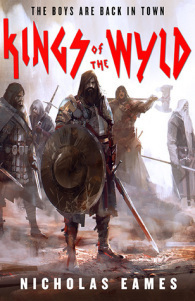
Humor is tough to pull off. Inside jokes can fail if they are too deeply buried to be noticed or so obvious they are less a joke and more a reference (hello Scary Movie and all of its knockoffs). Running gags can fall flat if used too often; or worse if they were not even funny in the first place (look up a Nakumara). So when an author proves within pages to be a deft hand with the dealing of jokes I already know I hold a book worth reading.
Dark fantasy can likewise be hit or miss. Without some sort of levity, be it through hope or humor, it has to be damn near perfect to justify the grimness or risk losing a…
View original post 601 more words


February 15, 2017
Interview with NICHOLAS EAMES
 Let’s start with an introduction: Who is Nicholas Eames?
Let’s start with an introduction: Who is Nicholas Eames?
That’s a question I’ve wrestled with for many years, actually. “The Luckiest Man in the World”… let’s go with that.
Your debut novel, Kings of the Wyld, will be published by Orbit next month. It looks great, and I’m really looking forward to reading it. How would you introduce it to a potential reader? Is it part of a series?
Kings of the Wyld is a fun, fast-paced fantasy novel that takes place in a setting where mercenary bands have gained the notoriety of rock stars. Between ‘gigs’ that include hunting monsters in the vast forest known as The Heartwyld or fighting them in crowded arenas, they drink to excess, party like madmen (or madwomen), and generally act like hooligans. The story follows a band called Saga, once the most celebrated mercenaries in all the world, who must reunite after…
View original post 1,157 more words
 [image error]
[image error]
January 29, 2017
Interview: Nicholas Eames, author of ‘Kings of the Wyld’
An interview (my first!) with Michael Everest: a reviewer, a writer, and an all-around swell guy!

First things first, let’s get something out of the way: the saying ‘don’t judge a book by its cover,’ well, sometimes you can’t help it. I’m sure there are readers out there who will argue that the saying is sound advice, but in the case of Kings of the Wyld by upcoming author Nicholas Eames…HOW CAN YOU NOT?!? I mean, look at it – IT LOOKS AWESOME! And it comes with high praise from none other than the fantasy giant John Gwynne (author of Malice, Velour, Ruin and Wrath – oh, and pun intended), which again, is on the cover.
I’ve judged it, and I’ve been found wanting…of this book!
Nicholas Eames is already making a name for himself, and the book isn’t even out yet! His debut, Kings of theWyld, billed as fantasy meets classic rock (a match made in heaven!), is due out at the end of February. I think it’s safe to say that…
View original post 856 more words


November 27, 2016
Review: Wake of Vultures
The road to writing professionally (or at least capably) is filled with more pitfalls than the first five minutes of Raiders of the Lost Ark, and the deepest, spikiest, most cunningly disguised of these is, in my opinion, understanding what really makes a book great. It’s not how unique your world is, or how thoroughly-plotted its history. It’s not necessarily the quality of the writing, though that certainly helps. It is not, ironically, the story itself.
It’s the characters.
We’ve all heard a great story mangled by the dullness of its protagonist, and conversely, have had something utterly mundane turned epic by a gifted narrator. In so many of our most beloved novels, it’s the “Voice” that captures us, beguiles us, keeps us turning page after page when we’re supposed to be writing our own books, goddammit! Inevitably, the best of these voices contain a perfect alchemy of characterization coupled with the author’s own personality. Be it Locke Lamora’s rapier wit, Kvothe’s romantic sentimentality, or [insert Joe Abercrombie character here]’s acidic pragmatism, these characters make it impossible not to feel an empathy that makes their victories so much sweeter and their defeats downright heartbreaking.
My point? There is a brand new star in the constellation of my most beloved fictional voices: Nettie Fucking Lonesome.
Which is not to say Nettie’s world isn’t interesting (it is), or her story isn’t incredible (it soooo is), but it’s the way she interacts with her world that makes her voice so compelling.
Wait–I’m getting ahead of myself aren’t I? My proverbial horse is squinting at the cart rolling down the road ahead of it. Okay, from the beginning, then.
Wake of Vultures is the first in a series called The Shadow, by Delilah S. Dawson (writing under the name Lila Bowen). Its protagonist, Nettie Lonesome, is a mixed-race, bisexual woman who self-identifies as a man, and was essentially a slave for the entirety of her childhood. Sort of the EXACT POLAR OPPOSITE of fantasy’s beloved straight white male whose adoptive parents love him unconditionally (likely because they suspect he is the Chosen One–which he invariably is). Nettie inhabits a world much like ours, where bigotry and racism run rampant, and so, she comes to realize, do monsters.
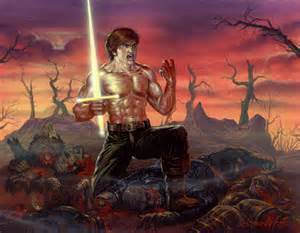 Pictured: White Male Chosen One, upset that he has no place in this book/current cultural climate.
Pictured: White Male Chosen One, upset that he has no place in this book/current cultural climate.A scuffle with a…huh…you know what? I’m going to try and not spoil anything–even the book’s first pages–for you here, because you’d damn well better go read it as soon as possible. It will suffice to say that, as with many great story structures, Nettie knows so little about her world that she and the reader learn about it together, which is a perfect device for building that aforementioned empathy. Fantasy books (and sci-fi books more so) have a tendency to drop you into a complex world and let you swim or drown, depending on your perseverance. This can be immensely rewarding, assuming you’re in the hands of a capable author, but a deterrent to many. In Wake of Vultures, the reader fights, rides, and socially stumbles along beside Nettie right from the beginning, and the result is a character that, despite being the opposite of, well, me, I felt extraordinarily attached to.
*Heart tugs on pant leg* “Hey, is it time for the pretty lines now?”
Me: “But I’ve got to dissect the–”
*Heart opens its eyes great big and wide, and thrusts out a quivering bottom lip* “Pweeeeze?”
Me: “FUCK! FINE!”
So…I’m a sucker for well-crafted sentences and beautiful lines, and I can’t tell you how many authors I’ll likely never read again because I’ve gone through an entire book without dog-earing a single page. Actually, it’s like three–because I chose books wisely. The point being, my copy of Wake of Vultures is positively riddled with pinned corners. In fact, I once tried to fold one over but couldn’t because I’d already marked something beautiful on the page before! This is all well and good, but also irritating, because I’m quite sure Delilah writes about 2000 more words a day than I do, so I wish they weren’t SO GODDAMN GREAT.
Anyway, here are a few of the many gems that delighted me along the way:
“Holy Crow, but she’d never felt so free. Like nothing could stop her. Like she could run forever on the endless plain. Like she could fly. Like the word stop suddenly held no meaning, and walls were just something to knock down. She inhaled the wind and breathed out fire, sucked in life and spit out the bones.”
Ah, geez. And this…
“But she’d also held, somewhere deep down in her heart, that she was special. That she was more than an unloved child, an unpaid servant, a dark splotch on their dirty white life. She’d figured maybe the homestead would catch fire and she’d drag out the drunk old coots and suddenly find out what a hug felt like.”
This one just gutted me. It’s out of context here, but still…
“Was it possible [he] could see exactly who she was? And was his destiny all twined up in hers like she hoped it might be? She let her fingers almost graze his where they lay on the ground. It wasn’t enough. Nothing ever was.”
And because I’m a sucker for swearing in any book...
“His face was fine-featured, with sharp planes and high cheekbones and an intelligent, thoughtful look to it. He was probably twenty to her sixteen but carried himself like he was forty and the president of a goddamn bank.”
Here was a doozy, though I’ll remove the name to keep it spoiler free:
“[It] was a nightmare, a hole in the starlight holding a silver spike. [It] was the absence of wind, the sound of no sound, a feather left in an empty cradle. Nothing like an apology.”
I mean, seriously. The only thing better than the second-last sentence in that paragraph is the LAST FUCKING SENTENCE. And now for something more frivolous:
“Nettie scanned the shed for anything useful, but all she saw saw were big clumsy things, like hoes and plows and men.”
And here’s a line I loved just because of its offhanded brilliance:
“She took a sip of the coffee, just to show him she could, and he settled back and spit a stream of tobacco juice at a fractious grasshopper.”
Fractious grasshopper!? Good goddamn I wish I’d thought of that!
So, yeah, I loved this book. I loved the character, and am now firmly aboard the Delilah S. Dawson bandwagon. Hell, I’m sitting on the baseboard swilling whiskey and haranguing the horses already! But in all seriousness, tackling the tropes of fantasy can be a tricky thing, especially when a white writer takes on the perspective of someone whose world is defined (in a negative way) by their race, and the colour of their skin. Bringing diversity to our genre has to be a group effort, from the publishers and agents choosing the tales of tomorrow, to the readers themselves, who, if they like stories that challenge the familiar, should support the hell out of them. It will also require authors straying from their comfort zones, making a real effort to create worlds and characters that people of every race/gender/sexuality can relate to, and be inspired by.
This book has certainly inspired me. Not because I could see myself in it, but because I could lose myself in it.
Dan’s laugh was short and harsh. “Because you were raised by ignorant people. They taught you to use things before you understood them. To kill things before you recognized them. To hate things before you knew them. But you’ll appreciate a thing better when you know where it comes from, when your hands know the shape of it.”
Thanks for reading,
Nick



October 7, 2016
Review: The Dragon Lords: Fool’s Gold
I can only imagine the day Jon Hollins (a pseudonym for Jonathan Wood) devised the plot for Fool’s Gold. He might have turned over the final page of some dour tome of epic fantasy and thought: Fuck this noise–I want something fun for a change. He may have googled, “Ocean’s Eleven meets The Hobbit,” figuring some brilliant bastard had already mashed these two worlds into one awesome story because WHY THE HELL WOULDN’T THEY!? And then, upon discovering this inexplicable vacuum in the universe of fantasy literature, he probably decided to write this book before anyone else did.
Because that premise–the idea of a rag-tag band pulling off elaborate heists under the noses (snouts?) of despotic dragon overlords–is frigging amazing.


I’ll admit it took me too many years on this planet to come around to certain things I now love. Coffee, for instance. Classic rock. Hell, I wasted most of my childhood NOT drinking single malt scotch (thanks for that bottle of Macallan 12 on my 7th birthday, Uncle Rob!). Humour in books was, lamentably, another. I bought my first Terry Pratchett book on the day he died, and so learned just a little too late what a devastating loss that was. And certainly, authors like Joe Abercrombie and Scott Lynch have gotten people used to having a laugh now and then between scenes of epic awesomeness.
Fool’s Gold, however, keeps those laughs going the whole way through. Every character, from the dragon-obsessed scholar who will do anything for a close encounter with one, to the hulking lizard-man whose answer to every question is to swing his hammer until the question itself is reduced to bloody pulp, brings something hilarious to the table. In fact, the aforementioned lizard-man, Balur, has such a unique and amusing manner of speaking that I found myself parroting it in real life (i.e. “I am thinking we are needing to be having some eggs!”).
What’s more, each character is infused with heart as well. Lette, the hard-bitten mercenary, struggles to reconcile the woman she was with the woman she wants to be, while Quirk (a great name for a sorceress, by the way) has a past so surprisingly dark that when she finally unleashes her pent-up rage it was all I could do not to shout, “YOU GET YOURS, GIRL!”
Okay, yeah, fine. I shouted it.
Even Firkin, the seemingly senile madman, is glimpsed via flashback saying some wonderfully poignant stuff as he explains what humankind is asked to accept as part of their subjugation to the Dragon Lords:
Firkin smiled, big and broad, and absent of all mirth. “Little things, Will. Little things. They asked us to live in fear. They asked us to give up everything we held dear whenever they wanted it. They asked us to live in poverty. They asked us to scrape by in the dirt when once we used to walk…maybe not tall, but not stooped either.”
A few other gems I found particularly shiny include the lines: ‘Dathrax dropped like a piece of flaming midnight’ and ‘Fire lanced down, scribbled murder on the battlefield‘. Yeah…Nicky likey.
Where this book really shines (surprise!) are the heists themselves. In the lead-up to each the reader finds themselves thinking, “Okay, yeah, I can see how this plan might work!” and I don’t think it’s spoilery to confess that the plans go to absolute shit–because where’s the fun if they don’t, right? And while it’s amusing to watch just how sideways things go, its even better to watch this hapless crew cope with the fallout.

Most satisfyingly, though, is that Jon saves the best for last. I typically read pretty haphazardly (while walking, or waiting for water to boil, or riding my unicycle during thunderstorms along the edge of shark infested waters) but the last dozen or so chapters of this novel were epic enough to keep me glued to the page, and let me tell you: the dragon-fight that concludes this book shall be the yard stick (or metre, as we Canadians say) by which I measure all future dragon-fights I read or write.
Though the story is wrapped up nicely by the end, there is a trilogy planned, and seeds are sprinkled throughout the first book that will undoubtedly grow some raucously ripe fruit. The second book is called False Idols, which I assume means we’ll learn more about Avarra’s shamelessly sex-crazed deities, whose oft-mentioned exploits make them sound like the gods of ancient Greece turned up to 11.
I get the sense we’ll see more and more humorous takes on fantasy in the years to come, perhaps because the world is dire enough that we need not turn to the written word to find our villains, our globe-threatening jeopardy, our soul-crushing despair. In the meantime, The Dragon Lords: Fool’s Gold leads the vanguard of books bred to lighten the mood.
“GO GET IT, GIRL!”
Thanks for reading,
Nick



September 2, 2016
F101: Intro to Fantasy
Good morning, class. My name’s Nicholas Eames, but don’t call me Mr. Eames–that’s my father’s name!
*Crickets chirping*
Okay. Moving on. We’re all here for one reason: we love fantasy books, and it is absolutely imperative to us that others like them too. You might liken us to a horde of theocratic zombies who won’t rest until everyone we know is, as the saying goes, one of us.
Alas, convincing others that fantasy books are head and shoulders better than books from any other genre (excluding sci-fi, but we’ll get to that later) isn’t always easy. I mean, you’d think it would be obvious, right? Writing is, after all, an exercise in creativity, and fantasy books, by their very nature, are more creative than plain old fiction. Now don’t get me wrong–fiction is great, but except for a few notable exceptions (aka. Salman Rushdie’s magic realism) it remains limited in scope, comparatively.
I’ll direct your attention to the board behind me, where I’ve drawn up a few examples of ‘basic fiction’ plots vs ‘fantasy’ plots.
BASIC FICTION PLOT: The fabric of a family is tested when their estranged father comes back to town.
FANTASY PLOT: The fabric of a family is tested when their estranged father comes back to town. The father is a wizard.
See? Poor old ‘basic fiction’ didn’t stand a chance. I mean, seriously, there is literally NOTHING the first book can contain that the second one can’t, and LITERALLY ANYTHING can happen in the second book. Let’s look at another example.
BASIC FICTION PLOT: Blah blah fucking blah.
FANTASY PLOT: Blah blah fucking blah. Also, dragons.
Again, no contest. Honestly, I could do this all day, but you see where I’m going with this? Done poorly, sure, fantasy has the capacity to be a spectacular failure, because its parameters for failure are so much greater. But done right, fantasy quite simply begins where fiction ends.
Of course, simply bashing someone’s preferred reading material is a poor way of convincing them to embrace your own. That said, it can be effective. I worked at a bookstore for several years, and every single day I would prop a Guy Gavriel Kay book in front of my cash register with a placard beneath it that read: “Whatever you’re about to buy, this is better.” Needless to say, I sold a shit-ton of GGK books and I fully plan on using this fact to extort an expensive lunch from him someday.
To be clear: I’m paying for lunch, I just want him to show up.

(Seriously though, this book actually is better than almost every book out there)
Ultimately, though, the best way to turn someone onto fantasy is to let them discover its joys for him or herself. And the best way to do that is to recommend a book they’re likely to love.
The key takaway here is ‘a book that THEY are likely to love’.
There are plenty of monstrous, complex, intricately-woven fantasy tomes that cater to those who already love the genre, but if your friend has just finished Gone Girl and you toss them Lord of the Fucking Rings (note: not its real title) there’s a good chance their leap for the precipice of fantastical enlightenment will end with a sheer drop and a wet splat.
You’ve gotta ease them in. Lubricate their entry to make it as smooth as possible. If necessary, caress their…you know what? I’m gonna move on.
My point is, you’ve got to choose the right book for the job, or else you’ll put them off forever. Now, I’m not going to tell you what the wrong book is, but I’ve managed to turn quite a few friends to the dark s–er, into fantasy readers over the years, so I will tell you which books I found a reliable source of conversion.
Before I do, however, there is something you absolutely must do before your would-be Frodo begins their journey. You’ve got to tell them about the names.
“Huh?” you ask.
You heard me. Tell them about all the odd and alien names they are about to read–names like ‘Targaryen’ and ‘Rhovanion’ and ‘Golgotterath’–and offer them the most important piece of advice you can possibly give to someone about to read their first fantasy book:
“YOU DON’T HAVE TO REMEMBER THEM.”
“Huh?” you ask, again.
I cannot overstate the above point enough. How many times have you heard someone disenchanted with fantasy say something like, “I just found it so hard to remember all the names.” If you’re anything like me, the answer to that question is ‘sixteen billion’. So you’ve got to tell them first: don’t fucking bother.
If you need to remember the name of a person or a place, then the author will keep mentioning it over and over again to make sure you do. Otherwise, all those names you’re reading, whether they belong to a colourful character or a faraway land, are just there to make the world seem more real.
To put it in even simpler terms, if you’re reading a book that takes place in the United States and a character offhandedly mentions they need to go to LAX to pick up their friend Becky from Seattle, you don’t scramble for a pen and scrawl down ‘Who is LAX? Where is Becky? What is Seattle?’ You just keep reading the damn book! And yet so many fledgling fantasy readers run into a word like ‘Illawor’ and lose their fucking minds.
So be sure and tell them: There will NOT be a test. Gloss over the name Maleagant the same way you would the name Steve. Just…keep…reading.
That said, if they’re still having issues remembering names then you might suggest putting down books forever and painting fruit-bowls in watercolour for what remains of their hapless lives.
Okay. So. Without further ado, here’s a few books that lend themselves to being enjoyed by a fantasy first-timer. I’m going to toss a few ‘sci-fi’ novels in here as well, because A) Us nerds are all in this together, and B) This whole exercise is about building trust; once you’ve got them eating out of your hand you can feed them whatever the hell you want. This list is, of course, a matter of my humble opinion.
Note #1: My opinion is not actually humble. If you disagree with me you’re very probably wrong.
Note #2: Just kidding. There are obvious gaping holes in my list–most notably the lack of female authors. The fault is mine, and is something I plan on remedying in the near future.
Note #3: the following books are in no particular order
The Magicians, by Lev Grossman
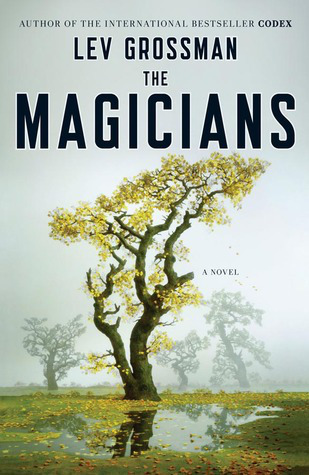
We’ve all got that friend who finishes Harry Potter and wonders, “Where do I go from here?” The Magicians might be just the thing for them. Like a lot of books, it’s been labelled as ‘Harry Potter for grown-ups’. First of all, Harry Potter IS for grown-ups, but this is a logical next step, since it’s basically what would happen if Hogwarts was a college instead of a middle-school. An angst-ridden teenager from Brooklyn gets invited to a prestigious school for magicians. Hijinks ensue. Also, it’s a TV show, and that often helps the uninitiated decide a book is worth their time. Sad but true.
Leviathan Wakes, by James S.A. Corey

Another book that’s been adapted into a TV show (The Expanse–it’s good, fucking watch it). Although (obviously) science-fiction, this book and its sequels keep the settings familiar, the characters relatable, and the story moving at a furious pace. The author is actually two people, and one of them, Daniel Abraham, wrote a series called ‘The Long Price Quartet’ that is damn phenomenal. Not a starter fantasy, perhaps (and I don’t mean that in a bad way), but if you already love the genre and haven’t read it yet, do so. Those books are works of art.
Traitor’s Blade, by Sebastien de Castell
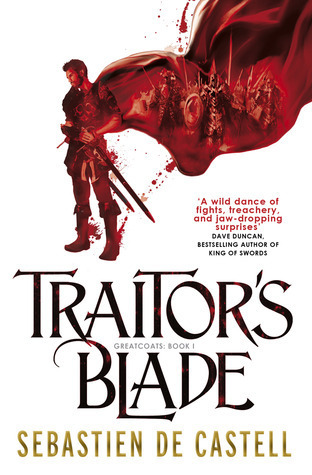
This book has two things in particular that make it good for newcomers to the genre: a healthy dose of humour, and a compelling voice. While most books narrate their story to you, this book (the whole Greatcoat series, in fact) feels like you’re perched on the shoulder of its protagonist, Falcio. Right from the opening line–“Pretend, just for a moment, that you have attained your most deepseated desire.”–you are treated more like a confidant than a reader. This is especially true of the sword-fights. Sebastien is a swordsman himself, and the encounters he describes are detailed without being complicated, and often hilarious. If your audience wavers before reading it, calling it ‘a fantasy version of the three-muskateers’ might goad them over the edge.
Old Man’s War, by John Scalzi

Speaking of books with stellar (cough*space pun*cough) opening lines, this book’s got one. How Old Man’s War isn’t a blockbuster movie at this very moment I have no idea. It’s about old people who get their consciousness transferred into youthful super-bodies and are shipped off to fight an intergalactic war. It’s terribly exciting, shockingly funny, and beautifully poignant. The writing, too, is phenomenally tight. Not a word wasted in this one.
Pretty Much Anything, by Neil Gaimon
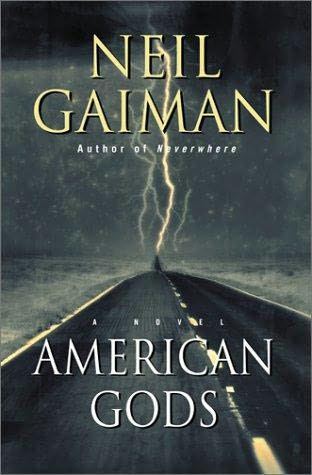
When I got a book deal people made jokes like ‘Remember me when you’re famous!’ The thing is, though, authors don’t get famous. There are remarkably few exceptions to this: Stephen King, George R.R. Martin, and Neil Gaiman among them. As stated above, anything by Gaiman will do, but Neverwhere and American Gods were my first two forays into his stuff, so I’d recommend those. A master of the craft, plain and simple.
The Blade Itself, by Joe Abercrombie

Remember when I said writers don’t get famous? Well here’s what I mean: Joe Abercrombie is a goddamn superstar of fantasy–if not our Tom Cruise, then at least our Mark Ruffalo. Yet when my mom says, “One day when you’re famous…” I say “Do you know who Joe Abercrombie is?” and she says “Nope!” and I say “Well I’ll never be as famous as Joe Abercrombie, mom,” and then she puts a plate of cookies in front of me and I forget what happens next.
Cool story, eh? The point is, he’s huge for a reason: his books are great. And, for me, every book he writes is better than the last. Although there are plenty of other places one can jump in, The Blade Itself is where to start. In case the blood-splatter on the cover didn’t make it obvious, these books require the person reading them to be cool with violence. If they are, and they enjoy a dash of wit mixed in with their blood, you’ve just given them a gift that will keep on giving for volumes to come.
Note #2: I know I said these were in no particular order, but the final three books are all but guaranteed to be loved by anyone with the capacity to grasp the written word. So here they are: the big three.
Ready Player One, by Ernest Cline

There are currently a few souls left on earth who haven’t heard of this book. Well, not for long. It’s Steven Spielberg’s next movie. Yeah, I know. He’s had a few misfires of late, but he’s about to have a real big blockbuster on his hands. This book is crammed from the front cover to the back with everything that is good about the world.
Does it help if the person reading it lived through the 80’s? Sure. Does it help if they’ve played a video game and/or dungeons and dragons once or twice. Yeah. Are either of these things necessary to enjoy this book? Hell no! Ready Player One is a masterpiece of pacing–it’s the only book (aside from anything by Guy Gavriel Kay and the next book on this list) that I would deem ‘utterly unputdownable’.
The Lies of Locke Lamora, by Scott Lynch

This is, without question, the book I recommend to people the most. It bears mentioning that Scott Lynch is not my favourite author (although he’s close) and this is not my favourite book (although it’s really, really damn close). Yet as evidence of how much I adore this novel, I use a page of it (all my copies seem to be falling apart) as my bookmark in every book I read, ever.

See?
Although technically the first in a series, one needn’t read the rest if they don’t want to (a selling point for non-fantasy readers). The book has a definitive ending, and boy does it end with a bang. The story of a con-man (and his companions) in what might be called a fantasy version of Venice, The Lies of Locke Lamora is face-paced, funny, and has a number of twists and turn-of-events that are both hilarious and horrifying. I’ve given this book to people who haven’t bothered to read a fictional book since high-school and heard them rave about it like lunatics a few days later.
Fair warning: If you give this book to someone you are responsible for making sure they eat/drink/occasionally void their bowels over the following days, because they will have better things to do–things like only reading this book and doing nothing else.
Also, its protagonist is named for a Final Fantasy character–ONE MILLION POINTS TO GRYFFINDOR!!!
The Name of The Wind, by Patrick Rothfuss
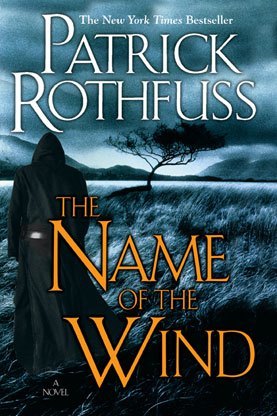
It was once said that the English-speaking world is divided into those who have read The Lord of the Rings books and those who are going to read them. Alas, I’ve come to terms with the fact that some fuckwits out there aren’t going to read The Lord of The Rings, and yeah–it sucks to be them, because I can’t even imagine living and dying on the sphere of planet Earth without having taken that particular journey. But thankfully, EVERYONE will read The Name of the Wind.
Hell, I think most people already have. In case you find someone who hasn’t, this book is the very definition of a ‘Sure Thing’. It comes with but one caveat: the first few chapters aren’t gonna blow you away. Wait, okay, the first few pages are (wherein Rothfuss literally invents the term cut-flower and then blows your fucking mind with it ), but after that the story (told in 3rd person at this point) is basically setting itself up.
And then it switches to 1st person.
And then the feels begin.
And then you’ve read a thousand pages and think where has this book been all my life?
Like few novels I have ever known, The Name of the Wind has the capacity to become someone’s ‘favourite book of all time’ while they’re still only half-way through. If I was pressed to describe this book (and, by extension, its author) in a single word, that word would be ‘genuine’. Alas, it is too simple a term, and too incredible a book, to be summarized succinctly, but if you’ve read it you’ll know what I mean. And so, too, will any person lucky enough to pick this one up for the first time.
There are hundreds and hundreds of beautifully quotable lines in this book, but the following is among my favourites.
“Go out in the early days of winter, after the first cold snap of the season. Find a pool of water with a sheet of ice across the top, still fresh and new and clear as glass. Near the shore the ice will hold you. Slide out farther. Farther. Eventually you’ll find the place where the surface just barely bears your weight. There you will feel what I felt. The ice splinters under your feet. Look down and you can see the white cracks darting through the ice like mad, elaborate spiderwebs. It is perfectly silent, but you can feel the sudden sharp vibrations through the bottoms of your feet.
That is what happened when Denna smiled at me.”
I know…
I know…
So ends my list. It is by no means comprehensive. It fails to mention favourites like Harry Potter, Game of Thrones, The Martian, anything by Guy Gavriel Kay or N.K. Jemisin, and the entire catalogue of Terry Pratchett books, all of which could easily ensnare the unsuspecting reader.
But if you’re looking for that perfect book for someone you wish shared your fervent love of fantasy and/or science fiction, then the above titles are worth a shot. They are, if you’ll permit my re-use of the zombie analogy, the highly-infective virus that will turn the unenlightened masses into one of us.
Thanks for reading,
Nick


August 12, 2016
Review: The Vagrant
Stranger: What’s that you’re reading?
Me: The Vagrant, by Peter Newman.
Stranger: Cool cover.
Me: Right?
Stranger: So what’s it about.
Me: (Standing, shouting as the lights in the coffee shop flicker, and smoke roils from the back room to curl ominously around my ankles) IN A WORLD TORN ASUNDER AND RESHAPED BY DEMONIC FORCES, A LONE NOMAD WANDERS THE APOCALYPTIC WASTELAND ON A DESPERATE QUEST TO PRESERVE THE PRECIOUS LIFE OF A NEWBORN CHILD.”
Stranger: (Backing away) Uh…
Me: ALSO, THERE’S A GOAT. (Drops coffee on floor, marches out. Returns a moment later to retrieve laptop and clean up the coffee, cause I’m a boss but also mad polite)

If you haven’t yet guessed, I’m a big fan of Peter Newman’s The Vagrant, which is unique not only because the setting and story are so appallingly cool (Necrotraders, anyone?), but because its protagonist begins a mystery and remains so for the entire novel. In many books, we not only hear every word our characters speak, but are often privy to their innermost thoughts as well. Not so here. The Vagrant himself is mute, and there is no internal narrative at all, only a series of enigmatic backstory chapters sprinkled throughout, so that by the time the book winds down you’re fully caught up to speed.
As I read The Vagrant I was struck over and again by a single thought: how hard must this book have been to write? Not only is it written in the immediate tense (he says this, she lifts that, etc.) but did I mention the main character is MUTE? Do you know how much dialogue fills a normal book? You there–in the back. Yes, that’s correct: a fuck-ton. To write an entire novel with only the sparse words of side characters to colour the story is something many long-established writers would be loathe to attempt, never mind that this is Newman’s debut novel. Kudos as well go to his agent and editor for taking a chance on what is not at all a conventional novel.
That said, it’s obvious from the get-go that Pete can write. The prose is descriptive without being verbose, sparse when it needs to be, and Newman uses commas like Michelangelo used nudity to decorate the Sistine Chapel: frequently, and with aplomb.

There’s also a fair dose of alliteration and evocative analogies to be found, like in this snippet here:
“Soon, voices call out: exaggerations and lies masquerade as hope. Others join them with offers and bargains. Unbeatable prices for the belongings of the beaten.”
Disclosure: I read while walking, and this line prompted me to laugh, look up, and mutter, “Unbeatable prices…Belongings of the beaten…fucking wow.” Only to start reading again and find it followed by this:
“People spill like vomit into the streets, congealing into crowds.”
Boy oh boy, how I wish I’d thought of that one first. Alas, my quest for the perfect puke analogy goes ever on…
Another well-crafted line went as follows:
“Genner’s rifle fires twice, silent, silencing.”
You’re killing me, smalls! And the whole damn book is filled with efficient, effective sentences like the one above.
Bottom line: if you’ve read this far you’ve officially wasted your time–you could be, like, three pages into The Vagrant by now. Is it possible a book without a surplus of dialogue isn’t your cup of tea? Sure, maybe, but you really should give it a try. There’s been a sequel recently released as well, called The Malice, which looks at a glance that it would read just fine as a standalone story. It’s on my to-read list, for sure.
As The Vagrant should be on yours.
Thanks for reading,
Nick
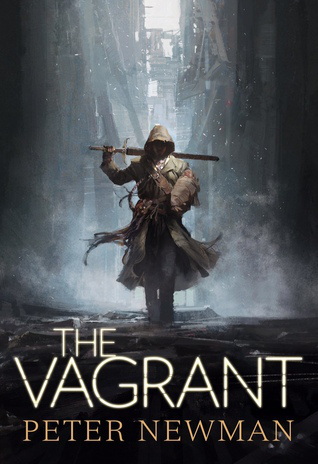


August 2, 2016
The Face of Our Fiction
So last week I got an early look at a preliminary sketch of what will eventually become the cover of Kings of the Wyld. It was, in a word, awesome. I can’t show you yet, however, or I’ll be hunted down and killed by the design team at Orbit. It was drawn by Richard Anderson, who, in case you are unfamiliar with his work, is FRIGGING INCREDIBLE at his job. Here’s some examples of cover’s he’s done in the past.

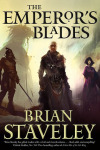

I know. Amazeballs. But more on that in a moment.
“Never judge a book by its cover,” said someone, somewhere, at some time or another, and something tells me this person read a lot of shitty books. Because yeah, you often can judge books by their cover, just as you can (again, often) judge a bottle of wine by its label, and a person by how much ice they put in a single malt scotch (hint: don’t put ice in a single malt scotch!).
There are, of course, exceptions to this rule, and it should be noted that I am absurdly nitpicky when it comes to book covers–and titles too, for that matter. Although a bad title title won’t necessarily turn me off, a good title can hook me in an instant. Examples of these are Scott Lynch’s The Lies of Locke Lamora, Seth Dickinson’s The Traitor Baru Cormorant, and Ada Palmer’s Too Like the Lightning. Another recent release with an extraordinary title is V.E. Schwab’s This Savage Song. Seriously, how beautiful is that?
On a similar note, a great cover has me at hello. Here are some examples of covers I dropped my literary panties for the moment I saw them.
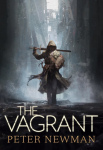


The first is Peter Newman’s The Vagrant, next is The Wind-Up Girl by Paolo Bacigalupi, and the last is Sebastien DeCastell’s Traitor’s Blade, and as their covers correctly suggest: these books are awesome. In fact, seeing the stunning art for Traitor’s Blade on twitter a few years back and resolving to read the book because of that is indirectly responsible for me landing a literary agent–and thus a book deal. So yeah…that cover literally changed my life for the better.
Which brings us back to my own. Due to my ‘fixation’ with fantasy books and their covers, I was justly skeptical that I would love (or even like) the art representing my own novel. I think book covers are largely responsible for whether or not someone picks up a book in the first place. Us fantasy aficionados (well, most of us, anyway) are inured to blazing swords and screaming wizards adorning the face of our fiction, but to many readers–no matter how emphatic a friend’s recommendation–this is hugely discouraging. The trick, then, is to strike a balance between intriguing the genre’s general readership while not alienating those willing to take a chance on something new.
Which is why, on the day my editor told me that Orbit had secured Richard Anderson to do the covers of my series, I was (almost!) as deliriously happy as the day I signed a contract with them in the first place. You see, I’ve been a fan of Richard’s work for a long time. I first fell in love with his art while playing Guild Wars 2, which is one of those rare video games where the developers didn’t use the vision of its concept artists as ‘inspiration’–they used it as the actual world. Granted, Richard isn’t the only talented artist this game features, but his unique style is everywhere, and is a key reason why, though several years dated, the game is still breathtakingly beautiful.
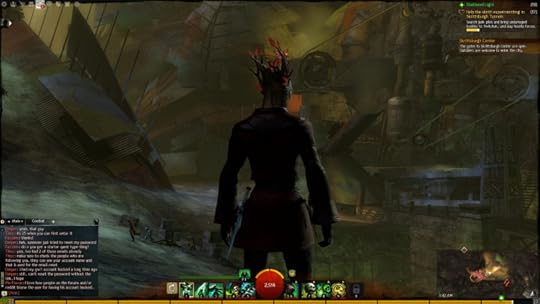
I took that picture in-game. My character’s name was Lastleaf, which I ended up using for a fairly prominent character in Kings of the Wyld. Since then, I’ve picked up several books bearing Richard’s art without knowing who he was or that they shared the same artist–until the day I bought Brian Staveley’s The Emperor’s Blades and Kameron Hurley’s The Mirror Empire at the same time and went, ‘Hey, I have a problem here! I’m addicted to Richard Anderson covers!’
By coincidence, the day after posting a picture of these two books, I had an offer on my series, The Band–and with it a magnificent editor/publisher who, knowing my odd fear of fantasy book covers, went above and beyond to make damn sure I will be as proud of the outside of my book as I am of what’s inside. My ‘addiction’ persists, however: In past months I’ve purchased Michael R. Fletcher’s Beyond Redemption (which I recently gave a very favourable review) and Wesley Chu’s Time Salvager, which is in the queue and is apparently excellent (I cried reading the acknowledgements, so that’s a good sign). Both have Richard Anderson covers.
Needless to say, when Kings of the Wyld hits shelves in February, it will be among the very best company. I hope it sells well due to word of mouth, but I can rest assured that its cover alone will be enough to endear it to many browsing book-lovers.
‘Hey Nick,” you may wonder, ‘Will you post the cover here when it’s finally finished?’
You’re goddamn right I will. I will post it everywhere. I will print it out and distribute it on flyers in the street. I will hire a team of sky-writers to replicate it in white smoke on a blue sky. I will look at it…well, for the rest of my life, probably…in awe and disbelief, wondering how I got so lucky.
As any parent does, I suppose.
Thanks for reading,
Nick


July 19, 2016
Review: Beyond Redemption
So I’ve just finished reading Beyond Redemption, by fellow Canadian Michael R. Fletcher, and let me tell you: it’s fantastic. It is also, in all probability, unlike any book you’ve ever read. In the acknowledgements Fletcher quotes his agent as calling the novel viscerally disgusting and its characters repulsive.
True and true.
I described it to friends as follows: “It’s like reading ‘Game of Thrones’ except every character is Walder Frey.” Which is to say they are morally repellent assholes, every one. And yet, somehow, it works. I found myself, improbably, rooting for the bad guys–in part because everyone is a bad guy.
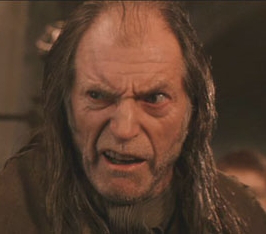
The book is set in a world defined by the delusions of its inhabitants. Sociopaths, kleptomaniacs, schizophrenics–the gang’s all here! It makes for a truly unique setting, and each character’s disorder (or, in some cases, disorders) manifests itself in a fascinating variety of creative ways. The cotardist assassins, for example, believe themselves rotting and dead, and so they are–and let me tell you, the only thing worse than being hunted by an assassin is being hunted by a relentless, unkillable, zombified assassin. What emerges from all this is a cast of diverse, peculiar, and distinctive characters that, despite their many failings, still manage to endear themselves to you.
Well, some of them. The obese slaver who eats ‘people stew’ and turns everyone he meets into a cannibalistic sex-slave is hard to find anything but reprehensible. Or maybe I’m just jealous? Moving on…
These brief glimpses into the characters’ less-ignoble selves are revealed in some beautifully composed snippets such as this:
“Wichtig is not my friend. The only person Wichtig likes is Wichtig.”
“Wrong,” said Morgen with absolute certainty. “He is the only person he hates.”
“Ooooooooh, SNAP!” is what I shouted upon reading this line, because it illuminates a heretofore unknown aspect of a character who has convinced both his friends and the reader of his utter self-certainty. With scenes like this, Fletcher plumbs the depths of characters who seem, on the surface, irredeemable, and shows the reader, fleetingly, what makes them the broken, complex, all-too-real people they are.
Beyond Redemption is a remarkable achievement. Its greatest triumph, I think, is that it remains true to itself. There is a satisfying, but far from happy, ending. The characters don’t ‘see the error of their ways’ or ‘turn over a new leaf’. In fact, they chop down the tree and burn it to ash. And I loved every page of it.
To summarize: the writing is stellar, the world is gritty and well-realized while remaining largely mysterious, and the characters are both flawed and formidable. If you feel like reading something truly different than the genre’s usual fare, then I wholeheartedly recommend you pick up Beyond Redemption.
Thanks for reading,
Nick



July 18, 2016
Who the hell is Nicholas Eames?
Hey, Nick here. I’m a fantasy author. Well, I’m about to be. My first novel, KINGS OF THE WYLD, is due out from Orbit U.S. in February 2017. I’m posting now for two reasons. Firstly, to get the ‘first post’ over and done with. Secondly, to tell you the kinds of things you can expect to see here on my blog.
Things You Will Very Probably Find Here
Updates and news about my book(s). Unsurprising, I know.
Thoughts/reflections/comments on writing in general.
Me raving about books/authors I love/admire
Mention of major life milestones. If I get married or win a trip to space, expect to hear about it.
Me discussing video games. Because I like them, and it’s important to me that you like them too. I won’t stop talking about them until you do.
Things You Probably Won’t Find Here
Me telling you what I ate for breakfast this morning. It was toast. See? Boring.
Political/Religious rants. There’s nothing I love more than sharing a glass of wine (or beer, or whiskey) with someone and systematically dismantling their wack-job ideologies, but there is a time and place for such things. It’s called ‘Thanksgiving Dinner’.
Me slagging off books/authors I don’t like. Unless one of them slags me off–then it’s all-out war. Also I really hope ‘slag’ means what I think it means.
Well, that’s it for now. If I think of something else I’ll be sure to amend the lists.
Thanks for reading,
Nick








